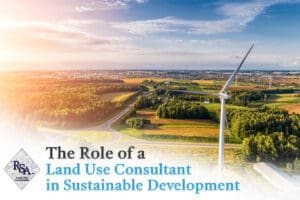 Sustainability is no longer just a buzzword – it’s a critical part of responsible development. Whether planning to build residential communities, commercial spaces, or industrial complexes, sustainability is central to both environmental responsibility and long-term financial viability. To ensure that your project adheres to best practices, engages with local communities, and complies with evolving regulations, hiring a land use consultant such as Richard Stevens & Associates is a smart move. But how exactly does a land use consultant contribute to sustainable development? Let’s dive in.
Sustainability is no longer just a buzzword – it’s a critical part of responsible development. Whether planning to build residential communities, commercial spaces, or industrial complexes, sustainability is central to both environmental responsibility and long-term financial viability. To ensure that your project adheres to best practices, engages with local communities, and complies with evolving regulations, hiring a land use consultant such as Richard Stevens & Associates is a smart move. But how exactly does a land use consultant contribute to sustainable development? Let’s dive in.
9 Ways a Land Use Consultant Contributes to Sustainable Development
1. Site Selection and Feasibility Studies
The foundation of any sustainable development is choosing the right site. A land use consultant conducts thorough site selection and feasibility studies to ensure you select a location appropriate for your project’s intended use while minimizing environmental disruption. They assess aspects such as soil quality, water sources, and proximity to protected areas. By analyzing these factors, land use consultants help developers avoid sites with fragile ecosystems or areas prone to environmental degradation, ensuring that your project begins on solid, eco-friendly footing.
2. Optimizing Land Use
Sustainable development isn’t just about conserving natural resources – it’s also about using space efficiently. Land use consultants are experts in zoning laws, land-use patterns, and urban planning principles. They help design the layout of your development with an emphasis on smart growth, compact design, and efficient use of land space. This can result in reduced urban sprawl, preservation of green spaces, and minimization of transportation needs. By optimizing land use, a consultant can help reduce the carbon footprint of your development from the get-go.
3. Water and Energy Conservation
Sustainable developments must prioritize conserving water and energy to reduce operational costs and lessen environmental impact. Land use consultants work with architects and engineers to incorporate green infrastructure solutions into your project. This can include designing energy-efficient buildings and utilizing renewable energy sources like solar or wind power. They may also recommend water-efficient landscaping, often known as xeriscaping, to further reduce water consumption.
4. Incorporating Green Building Standards
Green building standards, such as LEED (Leadership in Energy and Environmental Design), are essential for any developer aiming for sustainability. Land use consultants can guide you through the certification process, helping your project meet high sustainability standards. By ensuring your development adheres to these standards, you benefit the environment and enhance your project’s marketability.
5. Preserving Natural Habitats
In some developments, especially in rural or semi-rural areas, it’s vital to consider the existing wildlife and plant ecosystems. Land use consultants help ensure that your project minimizes habitat disruption. They can assist in designing around critical habitats, creating wildlife corridors, and even incorporating native species into the landscaping. This attention to biodiversity can play a crucial role in maintaining the ecological balance in and around your development.
6. Environmental Impact Assessments
Sustainability goes hand-in-hand with minimizing environmental degradation. Many jurisdictions require an Environmental Impact Assessment (EIA) before a project can begin. A land use consultant is essential in managing this process. They conduct detailed assessments to identify potential environmental impacts – such as air and water pollution, noise, and erosion – and recommend mitigation strategies. Understanding these impacts early allows you to make design and operational changes to avoid long-term environmental harm.
7. Community Engagement and Stakeholder Coordination
Sustainable developments thrive when they consider the needs and desires of the local community. A land use consultant facilitates dialogue between developers, community members, and other stakeholders, ensuring the project aligns with local environmental, economic, and social goals. Engaging the community early in the process helps identify sustainable priorities that can be integrated into the project design.
8. Navigating Regulatory Compliance
Sustainability often goes hand-in-hand with regulatory compliance, and navigating the web of environmental regulations can be daunting. Land use consultants are well-versed in the latest local, state, and federal legislation that governs sustainable development. They ensure your project meets all sustainability benchmarks, including those related to energy efficiency, waste management, and water conservation.
9. Long-Term Monitoring and Maintenance
Sustainability is an ongoing commitment, and land use consultants can help you develop long-term plans for monitoring and maintaining the sustainable aspects of your development. They can suggest sustainable materials, energy-efficient building techniques, and renewable energy systems like solar panels or geothermal heating. This forward-thinking approach reduces the environmental impact of the development while ensuring that it remains cost-effective and resilient for years to come.
Richard Stevens & Associates is Your Trusted Land Use Consultant
Sustainability is essential to development, and navigating the complexities of creating eco-friendly projects can be overwhelming. Richard Stevens & Associates provides the expertise needed to ensure that your development is sustainable, efficient, compliant with regulations, and economically viable. From site selection to long-term maintenance, our team of experts can provide insights to help reduce environmental impacts, preserve natural resources, and create spaces that benefit both people and the planet. Contact us today to ensure your development project meets the demands of a world increasingly focused on sustainability.

Leave a Reply